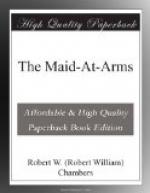“As at my door
I chanced to be
A-spinning,
Spinning,
A grenadier he winked
at me
A-grinning,
Grinning!
As at my door I chanced
to be
A grenadier he winked
at me.
And now my song’s
begun, you see!
“My grenadier
he said to me.
So
jolly,
Jolly,
’We tax the tea,
but love is free,
Sweet
Molly,
Molly!’
My grenadier he said
to me,
‘We tax the tea,
but love is free!’
And so my song it ends,
you see,
In
folly,
Folly!”
I listened angrily; the voice was Dorothy Varick’s, and I wondered that she had the heart to sing such foolishness for men whose grip was already on her people’s throats.
In the dining-hall somebody blew the view-halloo on a hunting-horn, and I heard cheers and the dulled roar of a chorus:
“—Rally your men!
Campbell and Cameron,
Fox-hunting gentlemen,
Follow the Jacobite back to his den!
Run with the runaway rogue to his runway,
Stole-away!
Stole-away!
Gallop to Galway,
Back to Broadalbin and double to Perth;
Ride! for the rebel is running to earth!”
And the shrill, fierce Highland cry, “Gralloch him!” echoed the infamous catch, till the night air rang faintly in the starlight.
“Cruachan!” shouted Captain Campbell; “the wild myrtle to clan Campbell, the heather to the McDonalds! An’t—Arm, chlanna!”
And a great shout answered him: “The army! Sons of the army!”
Sullen and troubled and restless, I paced the porch, and at length sat down on the steps to cool my hot forehead in my hands.
And as I sat, there came my cousin Dorothy to the porch to look for me, fanning her flushed face with a great, plumy fan, the warm odor of roses still clinging to her silken skirts.
“Have they ended?” I asked, none too graciously.
“They are beginning,” she said, with a laugh, then drew a deep breath and waved her fan slowly. “Ah, the sweet May night!” she murmured, eyes fixed on the north star. “Can you believe that men could dream of war in this quiet paradise of silence?”
I made no answer, and she went on, fanning her hot cheeks: “They’re off to Oswego by dawn, the whole company, gallant and baggage.” She laughed wickedly. “I don’t mean their ladies, cousin.”
“How could you?” I protested, grimly.
“Their wagons,” she said, “started to-day at sundown from Tribes Hill; Sir John, the Butlers, and the Glencoe gentlemen follow at dawn. There are post-chaises for the ladies out yonder, and an escort, too. But nobody would stop them; they’re as safe as Catrine Montour.”
“Dorothy, who is this Catrine Montour?” I asked.




